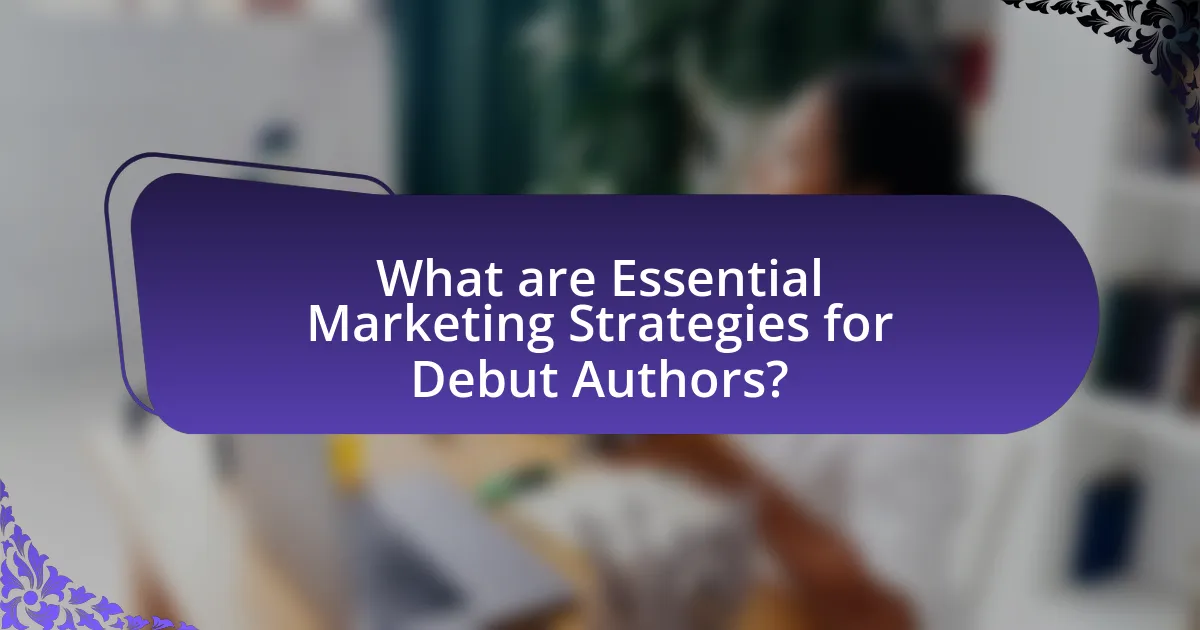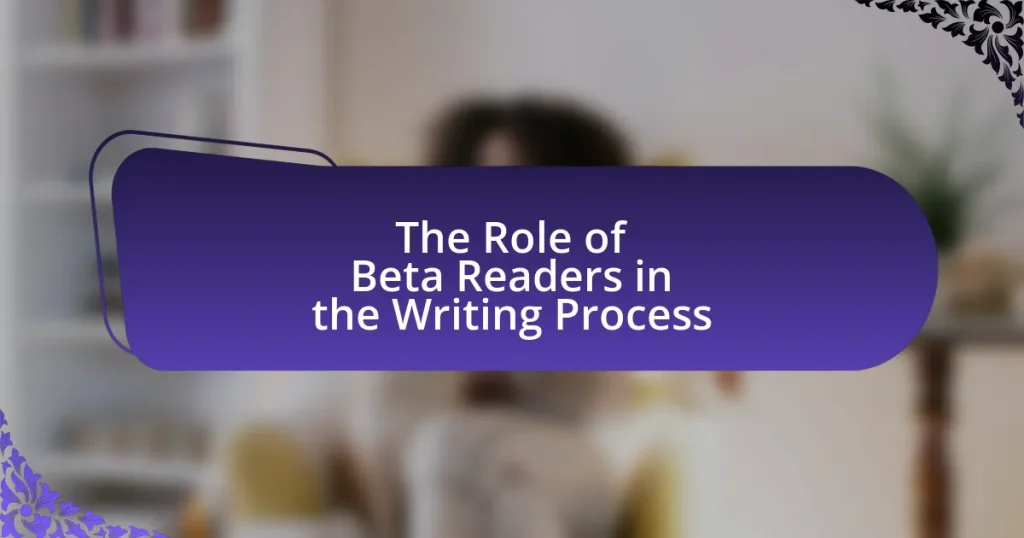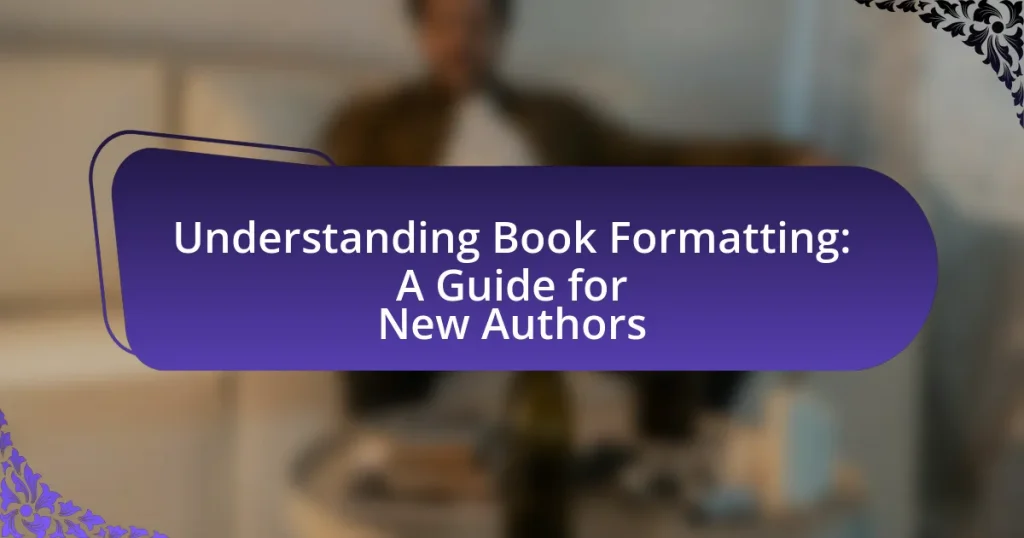The article focuses on essential marketing strategies for debut authors, emphasizing the importance of building an online presence, engaging with readers through social media, utilizing email marketing, and participating in book events. It highlights the challenges debut authors face, such as limited visibility and experience, and discusses how effective marketing can significantly impact their success by increasing visibility and driving book sales. Key components of a marketing strategy include audience identification, content creation, and leveraging various marketing channels, while best practices and common pitfalls are also addressed to guide authors in their promotional efforts.

What are Essential Marketing Strategies for Debut Authors?
Essential marketing strategies for debut authors include building an online presence, engaging with readers on social media, utilizing email marketing, and participating in book events. Establishing an online presence through a professional website and active social media profiles allows authors to showcase their work and connect with potential readers. Engaging with readers on platforms like Twitter, Instagram, and Facebook fosters community and encourages word-of-mouth promotion. Email marketing, through newsletters, helps authors maintain direct communication with their audience, providing updates and exclusive content. Participating in book fairs, readings, and signings increases visibility and allows for personal interaction with readers, which can enhance loyalty and interest in future works. These strategies are supported by data indicating that authors who actively engage with their audience see higher sales and reader retention rates.
Why is marketing important for debut authors?
Marketing is crucial for debut authors because it establishes visibility and builds an audience for their work. Without effective marketing, debut authors risk remaining unknown in a competitive literary market, where thousands of new titles are released annually. Research indicates that 70% of book sales occur through word-of-mouth and social media recommendations, highlighting the importance of a strategic marketing approach to engage potential readers. Additionally, marketing efforts can lead to increased book sales, which are essential for an author’s career sustainability and future publishing opportunities.
What challenges do debut authors face in marketing?
Debut authors face significant challenges in marketing, primarily due to limited visibility and experience. These authors often lack established platforms or networks, making it difficult to reach potential readers effectively. According to a survey by the Authors Guild, 76% of authors reported that marketing their books was a major challenge, highlighting the struggle for debut authors to gain traction in a competitive market. Additionally, debut authors frequently have limited budgets for promotional activities, which restricts their ability to utilize paid advertising or professional marketing services. This combination of factors creates a substantial barrier to successfully promoting their work and achieving sales.
How can effective marketing impact a debut author’s success?
Effective marketing significantly enhances a debut author’s success by increasing visibility and driving book sales. When a debut author employs targeted marketing strategies, such as social media campaigns, book signings, and collaborations with influencers, they can reach a broader audience. For instance, a study by the Book Industry Study Group found that 70% of readers discover new books through social media platforms, highlighting the importance of an online presence. Additionally, effective marketing can create buzz and anticipation around a book release, leading to higher initial sales and positive reviews, which are crucial for a debut author’s credibility and future opportunities.
What are the key components of a marketing strategy for debut authors?
The key components of a marketing strategy for debut authors include identifying the target audience, building an online presence, leveraging social media, engaging with readers, and utilizing promotional tactics. Identifying the target audience allows authors to tailor their messaging and outreach effectively, ensuring that their marketing efforts resonate with potential readers. Building an online presence through a professional website and author profiles on platforms like Goodreads and Amazon enhances visibility and credibility. Leveraging social media platforms, such as Twitter, Instagram, and Facebook, enables authors to connect with readers and share updates about their work. Engaging with readers through book clubs, author events, and virtual readings fosters community and interest in the author’s writing. Finally, utilizing promotional tactics, such as book giveaways, email newsletters, and collaborations with influencers, can significantly boost book visibility and sales. These components are essential for establishing a strong foundation in the competitive publishing landscape.
What role does audience identification play in marketing?
Audience identification is crucial in marketing as it enables businesses to tailor their strategies to meet the specific needs and preferences of their target demographic. By understanding who their audience is, marketers can create more relevant content, select appropriate channels for communication, and develop products that resonate with potential customers. Research indicates that targeted marketing efforts can increase conversion rates by up to 300%, demonstrating the effectiveness of audience identification in driving sales and engagement.
How can debut authors create a compelling author brand?
Debut authors can create a compelling author brand by defining their unique voice and establishing a consistent online presence. This involves identifying their target audience and tailoring content to resonate with that demographic, which can enhance engagement and loyalty. For instance, authors can utilize social media platforms to share insights into their writing process, personal stories, and interact with readers, thereby fostering a community around their work. Research indicates that 70% of consumers feel more connected to brands that share their values, highlighting the importance of authenticity in branding. By consistently presenting their personality and values, debut authors can effectively differentiate themselves in a crowded market.
What marketing channels should debut authors consider?
Debut authors should consider social media platforms, email marketing, book blogs, and online advertising as key marketing channels. Social media platforms like Facebook, Instagram, and Twitter allow authors to engage directly with readers and build a following, with 73% of marketers believing that their efforts through social media marketing have been effective for their business (Buffer, 2021). Email marketing enables authors to communicate directly with interested readers, offering personalized content and updates, which has an average ROI of $42 for every $1 spent (Litmus, 2021). Collaborating with book bloggers can enhance visibility, as reviews from established bloggers can significantly influence purchasing decisions. Additionally, online advertising through platforms like Amazon and Facebook can target specific demographics, increasing the chances of reaching potential readers effectively.
How can social media be leveraged for book promotion?
Social media can be leveraged for book promotion by creating engaging content that resonates with target audiences. Authors can utilize platforms like Instagram, Twitter, and Facebook to share excerpts, behind-the-scenes insights, and interactive posts that encourage reader engagement. For instance, a study by the Pew Research Center indicates that 69% of adults in the U.S. use social media, making it a vital channel for reaching potential readers. Additionally, using targeted ads on these platforms can increase visibility, as Facebook’s advertising tools allow authors to reach specific demographics based on interests and behaviors. Engaging with followers through live Q&A sessions or virtual book launches can also foster community and drive interest in the book.
What are the benefits of email marketing for debut authors?
Email marketing provides debut authors with a direct and cost-effective way to connect with their audience, fostering relationships that can lead to book sales and reader loyalty. By building an email list, authors can share updates, exclusive content, and promotions directly with interested readers, which increases engagement and encourages word-of-mouth referrals. Research indicates that email marketing has an average return on investment of $42 for every dollar spent, highlighting its effectiveness in reaching potential readers. Additionally, email allows for targeted messaging, enabling authors to segment their audience based on preferences and behaviors, which can further enhance the relevance of their communications.

How can debut authors effectively engage with their audience?
Debut authors can effectively engage with their audience by utilizing social media platforms to build a community and share their writing journey. Engaging content, such as behind-the-scenes insights, writing tips, and interactive Q&A sessions, fosters a connection with readers. According to a survey by the Pew Research Center, 69% of adults in the U.S. use social media, making it a vital tool for authors to reach potential readers. Additionally, hosting virtual events or book readings can create a personal touch, allowing authors to interact directly with their audience, which has been shown to increase reader loyalty and interest in future works.
What strategies can authors use to build a reader community?
Authors can build a reader community by engaging with their audience through social media platforms, hosting virtual events, and creating exclusive content. Engaging on social media allows authors to interact directly with readers, fostering a sense of connection and loyalty. Hosting virtual events, such as book readings or Q&A sessions, provides opportunities for real-time interaction, enhancing community bonds. Additionally, offering exclusive content, like behind-the-scenes insights or early access to new works, incentivizes readers to join and participate in the community. These strategies are supported by research indicating that active engagement leads to higher reader retention and satisfaction, as seen in studies on author-reader interactions.
How can authors utilize book clubs and reading groups?
Authors can utilize book clubs and reading groups by engaging directly with readers to foster discussion and promote their work. By providing discussion guides, hosting Q&A sessions, or attending meetings, authors can create a personal connection with their audience, which enhances reader investment in their books. Research indicates that personal interactions can significantly increase word-of-mouth recommendations, a crucial factor in book sales. For instance, a study by the Book Industry Study Group found that 70% of readers are influenced by recommendations from friends or book clubs. This demonstrates that authors who actively participate in these groups can leverage this influence to boost their visibility and sales.
What role do author events and signings play in audience engagement?
Author events and signings significantly enhance audience engagement by providing direct interaction between authors and readers. These events create opportunities for authors to share insights about their work, fostering a personal connection that can deepen reader loyalty. According to a study by the Book Industry Study Group, 70% of readers reported that attending author events increased their likelihood of purchasing books from those authors. This direct engagement not only boosts book sales but also encourages word-of-mouth promotion, as attendees often share their experiences with others, further expanding the author’s reach.
How can debut authors utilize content marketing?
Debut authors can utilize content marketing by creating engaging and relevant content that resonates with their target audience. This can include blog posts, social media updates, and newsletters that showcase their writing style, share insights about their book, and connect with readers. For instance, a study by the Content Marketing Institute found that 70% of consumers prefer getting to know a company via articles rather than ads, highlighting the effectiveness of content marketing in building relationships. By consistently providing valuable content, debut authors can establish their authority in their genre and foster a loyal readership.
What types of content can authors create to attract readers?
Authors can create various types of content to attract readers, including blog posts, social media updates, newsletters, and engaging videos. Blog posts allow authors to share insights, tips, and personal stories, which can enhance their connection with potential readers. Social media updates enable authors to interact with their audience in real-time, fostering community and engagement. Newsletters provide a direct line of communication, allowing authors to share exclusive content and updates, which can build anticipation for their work. Engaging videos, such as book trailers or author Q&As, can visually capture attention and convey the essence of the author’s writing style. These content types are effective because they leverage different platforms to reach diverse audiences, ultimately increasing visibility and reader interest.
How can blogging enhance an author’s visibility?
Blogging enhances an author’s visibility by providing a platform for consistent content creation that attracts and engages readers. Regularly publishing blog posts allows authors to showcase their expertise, share insights related to their writing, and connect with their target audience. According to a study by HubSpot, companies that blog receive 97% more links to their websites, which can significantly improve search engine rankings and online presence. This increased visibility leads to greater opportunities for networking, collaboration, and ultimately, book sales.

What are some common pitfalls in marketing for debut authors?
Common pitfalls in marketing for debut authors include inadequate audience research, over-reliance on social media, and lack of a clear marketing strategy. Inadequate audience research leads to targeting the wrong demographic, which can result in poor book sales. Over-reliance on social media often causes authors to neglect other effective marketing channels, such as email newsletters or book signings, limiting their reach. Additionally, a lack of a clear marketing strategy can result in disorganized efforts that fail to create a cohesive brand presence, ultimately hindering the author’s visibility in a competitive market.
What mistakes should debut authors avoid in their marketing efforts?
Debut authors should avoid neglecting their target audience in their marketing efforts. Understanding the specific demographics and preferences of potential readers is crucial for effective outreach. For instance, a survey by the Pew Research Center indicates that 72% of readers prefer to discover new books through recommendations from friends or social media, highlighting the importance of engaging with the right audience. Additionally, debut authors often make the mistake of underestimating the power of social media; platforms like Instagram and Twitter can significantly enhance visibility when used strategically. Furthermore, failing to create a professional author brand can hinder credibility; a consistent online presence across various platforms fosters trust and recognition among readers.
How can overspending on marketing be detrimental?
Overspending on marketing can be detrimental by depleting financial resources that could be allocated to other essential business functions. When a debut author invests excessively in marketing campaigns without a clear return on investment, they risk financial instability, which can hinder their ability to produce future works or maintain operational costs. For instance, a study by the Content Marketing Institute found that 70% of marketers struggle to measure the effectiveness of their campaigns, indicating that overspending may not yield proportional results. This misallocation can lead to missed opportunities in areas such as product development or audience engagement, ultimately affecting the author’s long-term success and sustainability in the market.
What are the risks of neglecting audience feedback?
Neglecting audience feedback poses significant risks, including misalignment with reader expectations and potential loss of market relevance. When authors ignore feedback, they may produce content that fails to resonate with their target audience, leading to decreased engagement and sales. For instance, a study by the Content Marketing Institute found that 70% of consumers prefer brands that listen to their feedback, indicating that neglecting this input can alienate potential readers. Additionally, without audience insights, authors may miss opportunities for improvement, resulting in stagnant growth and diminished credibility in a competitive market.
What best practices can debut authors follow for successful marketing?
Debut authors can follow several best practices for successful marketing, including building an online presence, engaging with readers on social media, and leveraging email marketing. Establishing a professional website serves as a central hub for information about the author and their work, which is crucial for visibility. Engaging with readers through platforms like Twitter, Instagram, and Facebook fosters community and encourages word-of-mouth promotion. Email marketing, particularly through newsletters, allows authors to communicate directly with their audience, share updates, and promote book launches effectively. According to a survey by the Author Marketing Club, 70% of authors who actively engage with their audience report higher book sales, demonstrating the effectiveness of these strategies.
How can authors measure the effectiveness of their marketing strategies?
Authors can measure the effectiveness of their marketing strategies by analyzing key performance indicators (KPIs) such as book sales, website traffic, social media engagement, and email open rates. For instance, tracking sales data before and after a marketing campaign can reveal its direct impact on revenue. Additionally, using tools like Google Analytics allows authors to assess website traffic changes, while social media platforms provide insights into engagement metrics, such as likes, shares, and comments. Email marketing platforms often offer open and click-through rates, which indicate how well the messaging resonates with the audience. By systematically evaluating these metrics, authors can determine which strategies yield the best results and adjust their marketing efforts accordingly.
What are some tips for maintaining consistency in marketing efforts?
To maintain consistency in marketing efforts, establish a clear brand identity and messaging framework. This involves defining your target audience, creating a consistent visual style, and using uniform language across all platforms. Research indicates that brands with consistent messaging can see up to 23% more revenue than those without, highlighting the importance of coherence in marketing strategies. Regularly scheduled content updates and engagement with your audience also reinforce consistency, ensuring that your marketing remains relevant and aligned with your brand’s goals.
What practical steps can debut authors take to implement their marketing strategies?
Debut authors can implement their marketing strategies by establishing a strong online presence through social media platforms, creating an author website, and engaging with their target audience. Social media allows authors to share updates, connect with readers, and build a community, while an author website serves as a central hub for information about their work, including a blog, book details, and contact information. Engaging with readers through newsletters or virtual events can further enhance visibility and foster relationships. According to a survey by the Author Marketing Experts, 70% of authors reported that social media significantly contributed to their book sales, highlighting the effectiveness of these strategies.



